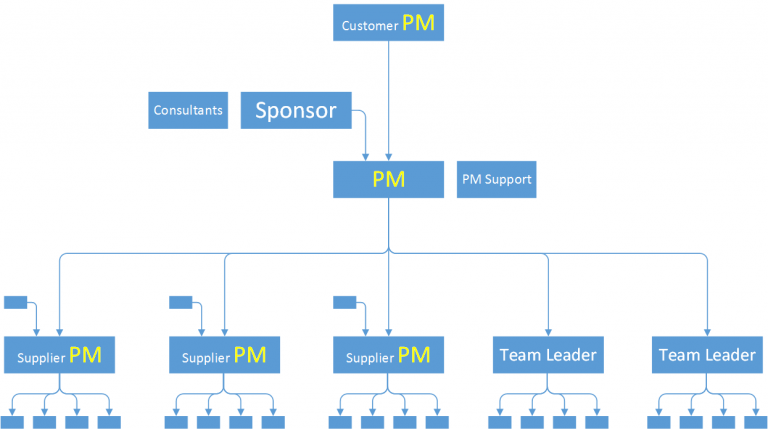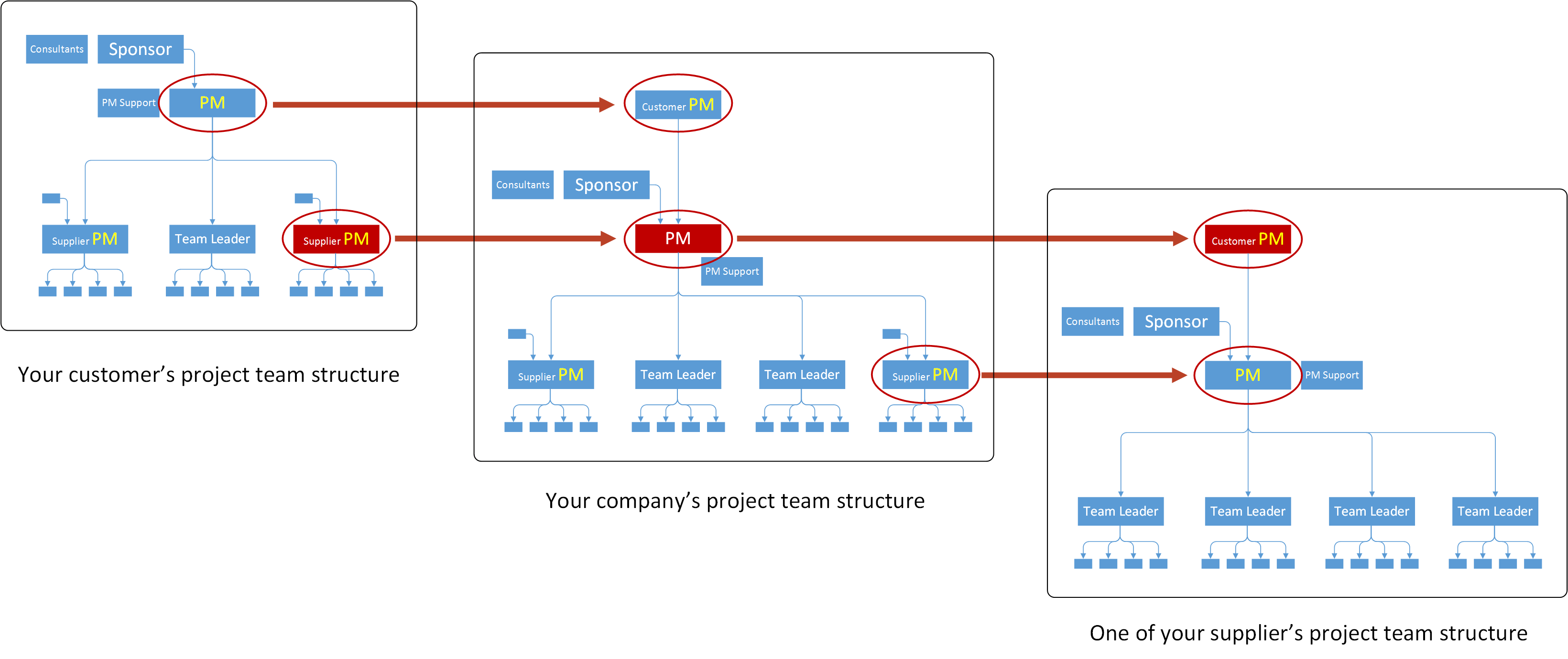A05 - Appoint the rest of the team
Note: This is the old version of P3.express. The current version is available here.
Then it’s time to appoint the rest of the key roles in the project.
- The Sponsor selects a few people as Consultants; those who can help the Sponsor understand the end-users and suppliers.
- The Project Manager may want to select a few people who assist them in project management activities, called PM Support (e.g., planners).
- In case parts of the project are delivered within your company, there will be one or more internal teams. The Project Manager appoints their Team Leaders at this point.
Note: the project is not approved yet, and nothing is going to be developed at this moment. However, we still need to have the roles assigned, to collaborate in the preparation activities. The same roles will be involved in the delivery of the project if it’s approved.
In this image, you’re the Project Manager in your company’s perspective, the Supplier PM in your customer’s perspective, and Customer PM in your supplier’s perspective:

Each company has its own project management system (Project Team structure, PMIS, Project Flow), and responsibilities to the companies above or below them. Everything explained in P3.express is about your own perspective, rather than that of the customer or suppliers. For example, the Business Case explained in P3.express is about the justification of the project for your company, which can be different from that of the customer. You may help the customer create their own Business Case, but it won’t be part of the management documents in your PMIS, and won’t be used to direct the project in your perspective.

The following is a summary of P3.express roles.
Sponsor
The Sponsor is a senior manager, and preferably a director.
Responsibilities:
- Making high-level decisions for the project, without getting themselves involved in the details, and without limiting the power of the Project Manager
- Funding the project
- Resourcing the project (especially when the project uses shared resources)
- Championing the project
- Approving the Business Case
- Approving the plans, with a high-level perspective (e.g. total cost and duration)
- Making the Go/No-Go decisions (A09 and A14)
- Setting the Delegation Limits and Plan Limits
- Making decision for RICs (Risks, Issues, and Change Requests) that are above the Delegation Limits (e.g. signing contracts with external suppliers)
- Making decision on the project approach when deviations are above the Plan Limits
- Appointing the Project Manager and Consultants
- Conduct the Post-Project activities, if there’s no program or portfolio management system for that
Competencies:
- Have authority in the company
- Have interest in the project
- Understand the business aspects of the project
- Capable of delegating power / not a micro-manager
- Able to spend 5 to 10 hours per month on the project
- Understand value and benefit management
- Have a strategic point of view, and focus on outcomes and benefits, instead of products and activities
- Be a good leader
- Have skills in negotiation and conflict resolution
Project Manager
Project Manager is the person who supports the team members to realize their potentials, and get the project done withing time, cost, scope, and quality targets. They are facilitators, coordinators, leaders, coaches, and mentors, rather than bosses.
The Project Manager reports to the Sponsor.
Responsibilities:
- Setting up the PMIS
- Facilitating the meetings (can be delegated)
- Ensuring the health (physical and mental) and safety of the team members
- Ensuring that regulations and laws are followed in the project
- Leading the planning and monitoring activities, and approving the output
- Leading the audit and satisfaction evaluation activities, and facilitating the improvement planning
- Making decisions within the Delegation Limits and Plan Limits
- Appointing the PM Support(s) and Team Leader(s)
- Approving Supplier PM(s)
- Handling the Focused Communications during the project
- Making sure that RICs (Risks, Issues, and Change Requests) are identified and controlled
- Accepting completed products from the Team Leaders and Supplier PMs
Capabilities:
- Leadership
- Facilitation skills
- Coaching, mentoring, negotiation, and problem solving skills
- A good listener
- Result oriented
- Complete understanding of P3.express
- Knowledge of the following is advantageous:
- PRINCE2®
- PMBOK® Guide
- Agile methods and frameworks
- Program management
- Portfolio management
- Value management
- Business Analysis
Refer to ICB for more information on Project Manager competencies.
Consultant
Consultants are officially appointed to help the Sponsor by bringing expertise and information on the following areas:
- Business needs, and benefits/value management
- End-users
- Suppliers and technical people involved in the project
PM Support
PM Support is anyone who’s officially appointed to help the Project Manager with their activities. They can be project planners, risk analysts, business analysts, document librarians, or generic assistants.
Team Leader
Each internal team in the company that is responsible for developing part of the product needs to have a Team Leader, who reports to the Project Manager. Team Leaders are technical people, as opposed to Project Managers who do not need to be technical.
Responsibilities:
- Participate in planning and monitoring of the project (including RIC {Risks, Issues, and Change Requests} identification)
- Report performance to the Project Manager
- Coordinate the team members
- Collaborate with other Team Leaders and Supplier PM(s) to avoid conflicts
Capabilities:
- Similar to the Project Manager
Customer PM
In case of external projects, there would be a Customer PM, in touch with the Project Manager, for coordinating and transferring information. This is specifically important when the customer has multiple suppliers, and they should be aligned.
In smaller projects when the customer doesn’t have a real Project Manager to play this role, we still expect one person from their side to be appointed as the contact point for the Project Manager; this person will be called the Customer PM.
Responsibilities:
- Providing the necessary information for planning and monitoring to the Project Manager (including scope and quality expectations)
- Making sure the Project Manager is coordinated with other Project Managers or Team Leaders who are working on the same project
- Making sure the internal team members are available to the kick-off meetings, and regular communications
Capabilities:
- Being available to the project
- Being result-oriented
Supplier PM
In case of having external suppliers, there will be a Supplier PM in each company as the contact point with the Project Manager.
Responsibilities:
- Similar to the Team Leader
Capabilities:
- Similar to the Project Manager